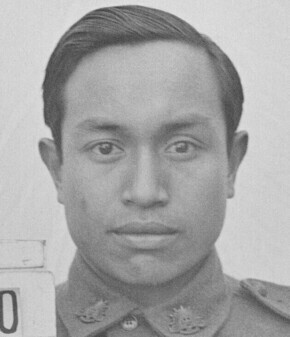SAMSUDIN, Bin Kalib
| Service Number: | WX36791 |
|---|---|
| Enlisted: | 6 March 1944 |
| Last Rank: | Corporal |
| Last Unit: | Not yet discovered |
| Born: | MINING KABAN, SUMATRA, 15 July 1918 |
| Home Town: | Not yet discovered |
| Schooling: | Not yet discovered |
| Occupation: | Not yet discovered |
| Memorials: | Broome Z Special Unit Memorial |
World War 2 Service
| 6 Mar 1944: | Enlisted Australian Military Forces (WW2) , Corporal, WX36791 | |
|---|---|---|
| 17 Apr 1946: | Discharged Australian Military Forces (WW2) , Corporal, WX36791 |
Story: Samsudin Bin Kalib
Samsudin ‘Sam’ Bin Katib (Sudin and Samsudin Bin Kalib, also named Katib Cipat) (W65780; WX36791), originally from Sumatra (Indonesia), born in 1918 in its northern town of Kaban. Samsudin first came to Australia as a passenger on the Centaur from Batavia and landed at Broome on 10 June 1937. He was employed as a diver in the pearl industry at Broome until February 1942 when he was evacuated to Fremantle.
Samsudin enlisted in 1942 in Claremont, Western Aaustralia, and also selected at Water Commando School, Queensland where he was trained and equipped to conduct special operations. At Fremantle, he joined first the RAN, but got his discharge after three months’ service, then joined the Australian Military Forces at Claremont on 20 June 1942 serving until 5 March 1944, and then again, in the Australian Imperial Force from 6 March 1944 to 17 April 1946. Qualified as a parachutist, Corporal Bin Katib served in a Special ‘Z’ Unit working behind the Japanese lines in Borneo, involved in intelligence-gathering. His knowledge of the local language certainly helped him in his important role. His total effective period was 1398 days, including 1199 days in Australia and 199 days overseas.
After the war, in 1947, Bin Katib returned to Broome and resumed employment in the pearling industry. By then he was considered a ‘good diver [who] gets lots of shell’. Bin Katib was instrumental in the establishment of the Indonesia-Malay Association which collided with the interests of the Pearlers’ Association and the White Australia Policy regulations, erupting in bitter disputes. His case received a lot of publicity, but it ended in his deportation from Australia, which was regretted by his close mates and work colleagues. However, his contribution to the Australian Army is not forgotten as his name is listed on the Special Forces’ Roll of Honour.
From the book:
Dzavid Haveric, 'A History of Muslims in the Australian Military from 1885 to 1945: Loyalty, Patriotism, Contribution', Cambridge Scholars Publishing, London, 2025.
Submitted 18 April 2025 by Dzavid Haveric









